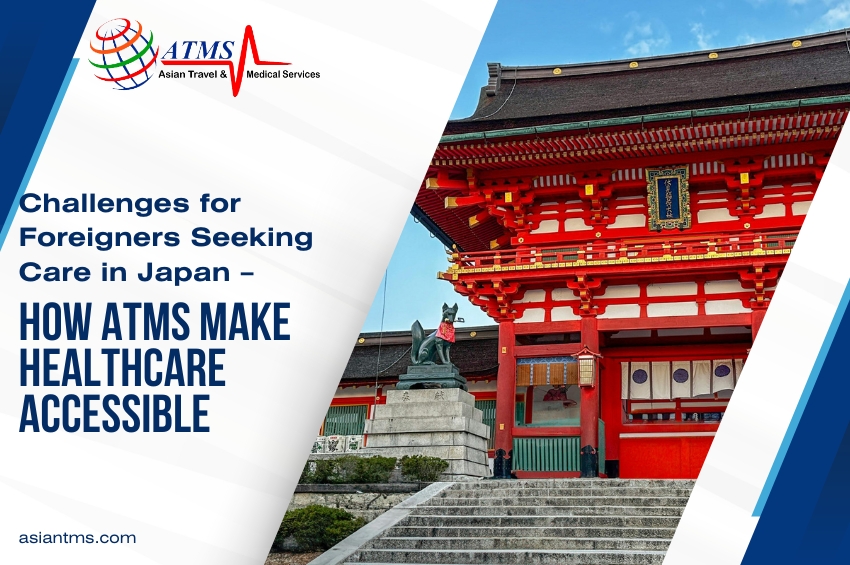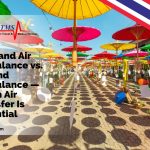
Introduction
Japan is commonly praised for significance one of the most significant progressive healthcare systems in the world. From cutting-edge nursing neighborhoods in Tokyo to highly skilled specialists across the country, the quality of care is globally acknowledged. But for foreigners—whether travelers, expats, or business professionals—accessing that care is not straightforward.
At Asian Travel & Medical Services (ATMS), we think about these challenges. Our Medical Services provider in Japan aims to help along between excellent Japanese medicine and the needs of worldwide patients. In this blog, we’ll explore the main difficulties foreigners face when seeking care in Japan and by means of what we make the process stress-free.
Language: The First Barrier to Access
While many Japanese doctors are highly prepared, especially in city hospitals, English fluency among healthcare staff is frequently limited. This constitutes a communication break that can lead to misunderstandings during consultations, disease, or treatment.
For foreigners, this can mean:
- Struggling to characterize symptoms definitely.
- Difficulty understanding prescriptions or treatment plans.
- Stress all the while, emergencies when fast resolutions are needed.
At ATMS, we resolve this by providing multilingual support, ensuring our customers never feel lost in translation. From analyzing medical agreements to managing filing, we make ideas smooth and accurate.
Understanding Hospital Costs and Payment Procedures
Common challenges include:
• Upfront Payment Requirements
Some hospitals demand payment before medication begins, which can be confusing for adventurers.
• Complex Billing Systems
Hospital invoices may contain multiple line parts, often in Japanese, making it hard to understand the actual cost.
• Unexpected Fees
Additional charges for tests, imaging, or specialized consultations can not be clearly explained.
At ATMS, our Medical Assistance provider in Japan assists by:
- Explaining costs and fee expectations in clear, comprehensible language.
- Coordinating accompanying hospital advertising departments to prevent surprises.
- Guiding clients through fee procedures, so they can focus on receiving care rather than worrying about money.
By directing these aspects, we guarantee that financial concerns don’t increase unnecessary stress on your healthcare knowledge in Japan.
Limited Availability of International-Friendly Hospitals
Not all clinics in Japan are outfitted to handle worldwide victims. In main cities like Tokyo, Osaka, and Yokohama, private wards have worldwide hospitals accompanying English-speaking staff and multilingual websites. But outside these hubs, the chance drops sharply.
For tourists in regional extents, the reality can include:
- Difficulty judging a hospital that accepts overseas patients.
- Lack of English-speaking staff in country clinics.
- Limited crisis infrastructure in detached destinations.
Our ATMS team helps by recognizing and coordinating accompanying international-friendly hospitals everywhere, whether it’s an abundant teaching hospital in Tokyo or a trustworthy local facility in Hokkaido.
Cultural Differences in Medical Communication
Japanese healthcare ideas can feel very different from what international subjects expect. Doctors can be more conservative in sharing analyses, preferring not to overwhelm patients accompanying too much news at once. Patients are less likely to question or challenge doctors, which may be confusing for foreigners used to more shared consultations.
Foreigners may face:
• Unclear Explanations
Treatment plans can not always be written in depth.
• Limited Involvement
Patients may feel left out of being in charge.
• Different Etiquette
Direct questioning may be seen as unusual.
At ATMS, we serve as cultural mediators, making certain our clients understand the clarity they need while regarding Japanese norms of ideas.
Emergency Time
- Ambulance staff may have restricted English communication.
- Emergency areas prioritize sustaining patients but can not offer detailed clarifications.
- Patients without security or cash deposits may face delays in non-critical situations.
Our medical repatriation services provider in Japan provides 24/7 crisis coordination, organizing ambulances, and ensuring our customers are admitted fast and appropriately.
Prescription and Pharmacy Challenges
Even later, during a hospital visit, foreigners may fight with pharmacies in Japan. Some issues include:
- Prescriptions inscribed only in Japanese.
- Different brand names for the same cures.
- Limited availability of certain drugs that are common overseas.
ATMS helps clients by:
- Translating prescriptions into clear education.
- Guiding patients to pharmacies accompanying experience serving worldwide customers.
- Consulting accompanying doctors on alternatives when a drug is not accessible in Japan.
What Foreigners Should Look for in Healthcare Support
Before selecting a medical duties partner in Japan, believe:
• Language Support
Does the provider ensure ideas in your language?
• Hospital Network
Are they affiliated with both private and public institutions?
• Emergency Response
Can they arrange necessary care 24/7?
• Continuity of Care
Do they stay with you from confirmation to discharge?
At ATMS, we meet all these criteria and more.
How ATMS Make Care Stress-Free in Japan
We see that healthcare challenges don’t stop at the hospital gate. That’s why our emergency medical services in Japan cover all stages of the patient journey:
• Hospital Liaison
We coordinate appointments, admissions, and attend-ups.
• Translation & Cultural Support
We guarantee nothing gets lost in rewording.
• Emergency Evacuation
For severe cases, we organize transfers within Japan or overseas.
• Patient Advocacy
We stay by your side to make sure you’re wealthy, informed, and supported.
With us, healthcare in Japan focuses less on navigating obstructions and more on taking the treatment you need, accompanied by peace of mind.
Contact Us
Japan offers some of the best health care in the world, but foreigners often face challenges that can turn a nursing home visit into a stressful experience. Language gaps, security issues, cultural dissimilarities, and payment beliefs are real difficulties—but they don’t have to be.
At ATMS, we confirm international patients receive the right care, at the right time, in the right place. Whether you’re a traveler surveying Tokyo, an expat using Osaka, or a business professional in Kyoto, our act is to connect you seamlessly to Japan’s best healthcare services. Reach out to us today for further information.



